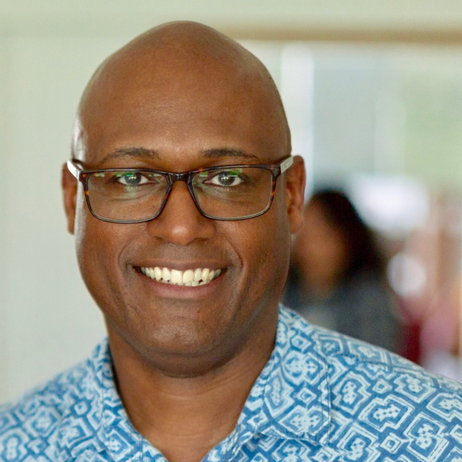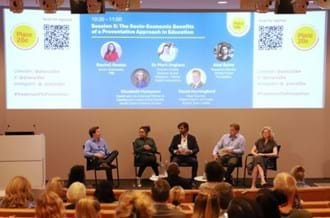What do we need to know to have fruitful race conversations?
What do we need to know to have fruitful race conversations?

Eugene Ellis
Eugene is an activist, writer, psychotherapist and speaker on issues of race and intersectionality. His book, 'The Race Conversation: An essential guide to creating life-changing dialogue', explores the intersection of race and trauma, the non-verbal communication of race and how we might navigate oppressive patterns.
Eugene Ellis, founder and director of The Black, African and Asian Therapy Network (BAATN), writes a guest blog on how to have conversations about race.
The race conversation is happening all the time. It happens when we talk to each other, but mostly happens without words. The non-verbal communicates very powerfully as we know. It’s in our eyes and our gestures; it’s in our tone of voice. The non-verbal, as we also know, is directly linked to a complex mix of unconscious processes. What processes then, lie beneath the non-verbal, and what forces drive the unconscious?
When we become flooded, we lose ourselves. Is it then possible to move beyond this experience and our self-preoccupations around race and get to a place of genuine communication and healing?
As I went through my own process of healing from the wounds of racism, I became aware that I am intimately connected to the history of the British Empire. Most of that history is stored in my body, out of my awareness. That history communicates itself in how I walked, how I talked, my eye contact, my patterns of speech. I realised that race is not just in Black and brown bodies, however. Race is also in the bodies of white people who, like me, are also intimately connected to our colonial past.
I also realised that the non-verbal is how race is mostly communicated, silently and under the radar. I realised that the non-verbal was how we police the borders of race and how we keep the racial status quo. Another important aspect of the non-verbal that I came to understand was that the non-verbal is also the source of personal and collective healing.
I have spoken to many others who are also on a journey around racial identity. Either their own racial identity or trying to understand the racial identity of an important person in their life and what they might be going through. I have also spoken to many people who feel an ethical pull towards being an active citizen in dismantling racism but feel disconnected or overwhelmed with just the idea of race itself or how they might contribute and navigate the racial landscape.
There is a central problem for all of us around race. That is, in order to undo the impact of race, we need to have a dialogue and conversation.
What gets unattended to in all of this pushing away is the daily experiences of hurt that Black people, brown people and people of colour experience through racism.
What, then, do we need to know so that our chances of having fruitful race conversations can be increased?
We first need to have a working understanding of how the construct of race operates. What is the history of race, and what function does it play in society? More importantly, how does the race construct and its history relate and connect to us personally? The race construct is centred around the two central constructs of Whiteness and Blackness. These constructs need to be unravelled, and their implications need to touch the heart.
We also need to constantly remind ourselves that the history of race is in all of our bodies. When the bodies' history is triggered, we play out our assigned roles based on our assigned racial identities by evoking the race construct through words or actions. If our racialised behaviours are brought to consciousness, there is discomfort and a pressing demand to withdraw. What most people report when race is on the table, is the feeling of danger. We will then do pretty much anything to move away from that feeling and come back to safer ground. The idea of what is safe then becomes of concern. In our minds, we can logically claim, for much of the time, that we are not in danger if we speak of race. We can also claim we have good intentions with people we otherwise would trust, but our bodies often hold a different story. For those that work with trauma, it is well known that the body frequently trumps the mind when it comes to what actions we take.
Finally, we need to take on board that race isolates us from each other and also from aspects of ourselves. Race is a very unforgiving landscape, and if we are working through race on our own, it will be tough to make progress. It is essential, I believe, to go on the journey with other like-minded individuals.
Overall then, having a working understanding of how race operates, having an awareness of how race lives in the body - as well as the mind - and exploring race identity with like-minded others is the work we need to do, post-slavery and post-colonisation. Essentially, developing these resources will ensure that we do not continue to turn away from the distress that the race construct inflicts on all of us.
To read more from Eugene or for details of his book, visit his website, or follow him on Twitter.
This blog was written in a personal capacity and does not necessarily reflect the view of the organisation.
News & blogs

Place2Be conference unites sector leaders around a mission to improve childrens mental health
Place2Be presented a conference to bring together school leaders, commissioners, funders and mental health experts.
Read more
The Young BAFTA Roadshow with Place2Be arrives in Lambeth, London
Read about the visit the Young BAFTA Roadshow made with Place2Be in Lambeth, London.
Read more
The Young BAFTA Roadshow with Place2Be arrives in Birmingham
Read the press release of the Young BAFTA Roadshow visit with Place2Be at Birmingham.
Read more



